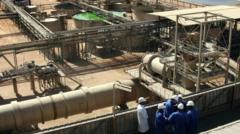The military government of Niger has declared its intention to nationalize Somaïr, the country's largest uranium firm, which is operated by the French nuclear giant, Orano. This decision marks the latest move in a growing rift between Niger, a former French colony, and France, as the junta seeks to assert more control over national resources since coming to power in a coup in 2023.
Niger Junta Moves to Nationalize Uranium Firm Amid Tensions with France

Niger Junta Moves to Nationalize Uranium Firm Amid Tensions with France
Niger's military leaders announce the nationalization of a French-owned uranium company, escalating diplomatic tensions with France.
The junta's announcement cites a desire for improved and sustainable management of Niger's mining resources, which are critical to the nation's economy. Niger is recognized as the seventh largest uranium producer globally, holding some of the richest ore deposits on the African continent. Officials noted, "This nationalization will allow for healthier and more sustainable management of the company and, consequently, optimal enjoyment of the wealth from mining resources by Nigeriens."
Historically, Orano has held a 63% stake in Somaïr but was stripped of operational control by the military government last year. The company, owned by the French state, has initiated legal proceedings against the Nigerien government in response to these actions. Analysts warn that the ongoing tensions could lead to job losses and reduced export earnings, highlighting the delicate balance of power in the region.
Niger's push for independence from French economic influence is viewed as a significant shift, especially as the junta leans towards closer ties with Russia. This situation underscores lingering historical grievances from Niger's independence from colonial rule in 1960, and signals a possible reevaluation of foreign relations in West Africa.
As the conflict unfolds, the implications for Niger’s economy and its relationship with France remain to be seen, with both local and international observers closely monitoring the developments.
Historically, Orano has held a 63% stake in Somaïr but was stripped of operational control by the military government last year. The company, owned by the French state, has initiated legal proceedings against the Nigerien government in response to these actions. Analysts warn that the ongoing tensions could lead to job losses and reduced export earnings, highlighting the delicate balance of power in the region.
Niger's push for independence from French economic influence is viewed as a significant shift, especially as the junta leans towards closer ties with Russia. This situation underscores lingering historical grievances from Niger's independence from colonial rule in 1960, and signals a possible reevaluation of foreign relations in West Africa.
As the conflict unfolds, the implications for Niger’s economy and its relationship with France remain to be seen, with both local and international observers closely monitoring the developments.



















